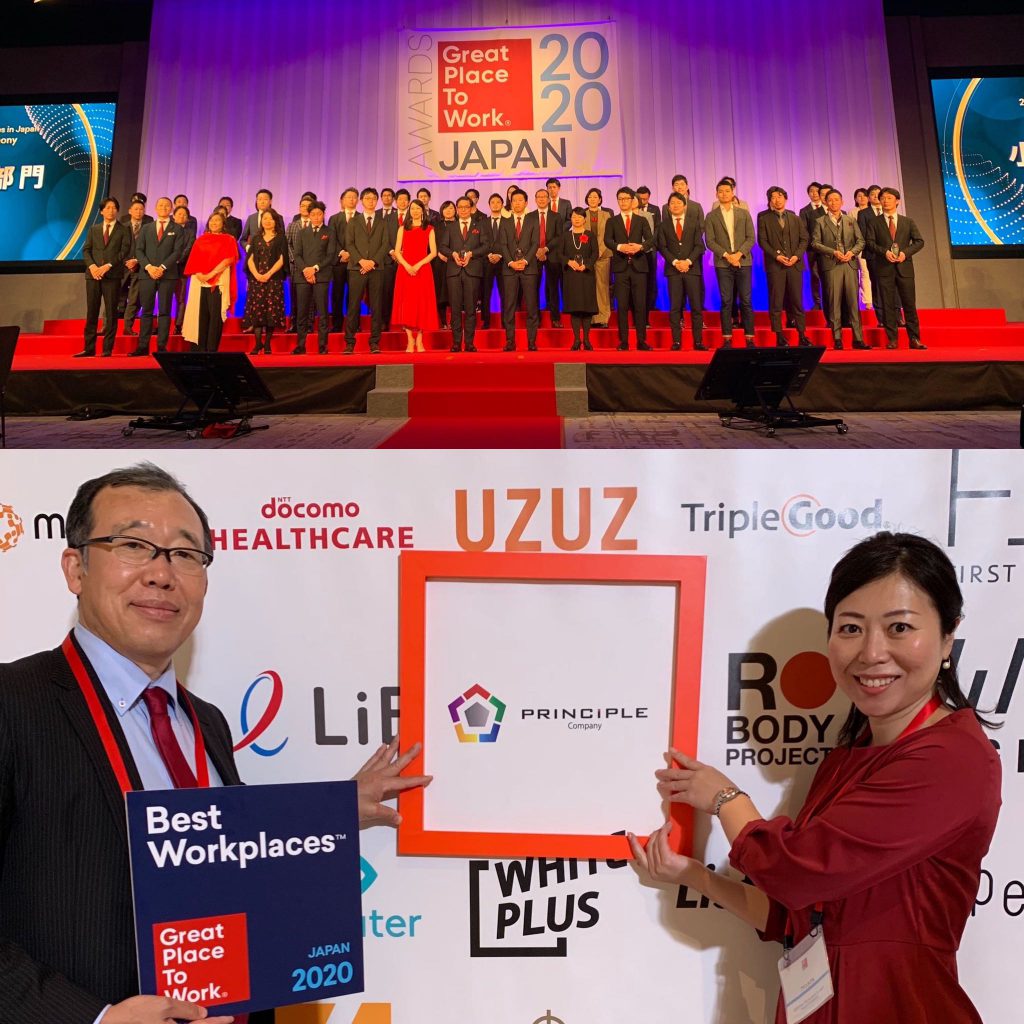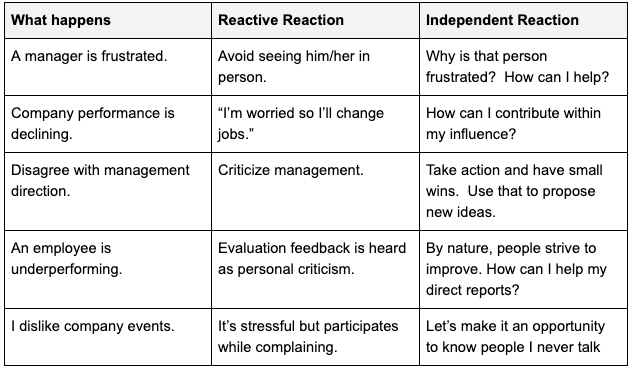We rank 31st on Great Place to Work® company rankings! Now the real work begins.

In this year’s Japan edition of the Great Place To Work® company rankings, Principle ranks 31st (up from 45th last year!). In the United States, the announcement was featured in FORTUNE magazine. Being in the company of SalesForce, Hilton, Accenture, BCG, and other global leaders, is a tremendous honor and proof that Principle is also a leading company.
At Principle, we pride ourselves on implementing many progressive measures that push the traditional ways of working and relationships between individuals and the company. Rather than forcing individual abilities into constraints such as company rules and regulations, we strive to improve performance by providing an environment where people can exercise and develop their abilities as freely as possible.
We believe that all of this provides better results and values to our customers and society overall, and ultimately helps our employees realize their dreams. In fact, we have employees who join our company with high expectations for Principle’s workplace and culture, and we strive to exceed these.
However, as great as the Great Place To Work® accolades and our focus on workplace culture are, we continue to address challenges daily to create a truly great workplace environment. As any manager and business leader knows, issues and challenges revolving people always exist.
For Principle, these challenges shifted recently when we stepped out of what we call the “lifestyle business”, commonly associated with 30 employees, alignment with the founder’s ideas, all employees are excellent performers, and are happy. We noticed the growing challenges as our employee count surpassed 90 and since we made the decision to go public on NASDAQ. This threshold is also referred to as the scale wall, the wall of 50 people, the wall of $10Million, and so on.
For example, one of the challenges we face as a growing organization is the reality of employee turnover. If we refer to the individuals as highly skilled elites in their area of expertise, it sounds very good. However, with a growth business, resources become more strained, and so there’s an increase in job rotation opportunities.
Under such circumstances, individuals cannot always determine their own career plans within the company, experiment with new ideas, and personal dreams might not always come true as employees might like, even if the business is going well. At some point, it is natural for those employees to explore job opportunities elsewhere.
Staff turnover creates additional resource shortages, resulting in an increased burden on the remaining team members as the workload naturally increases. Employees who can no longer handle the burden will eventually leave, which can be a vicious circle that is problematic. At Principle, we know this from experience. Our turnover rate was low until employee size grew over 30. Ironically, over the past year, as our Great Place To Work® ranking increased, our employee turnover has also grown.
Even world-class companies such as Google, Apple, and Starbucks face such challenges. Not only the turnover rate but also strong or poor company performance may force companies to adjust their course often. There will always be management or strategy issues when growing in a competitive market. Moreover, the times are “uncertain” in every respect. And I speculate that conditions arising from general social uncertainty that also impact a company’s culture, regardless of the company’s size or reputation.
The question we continually ask ourselves is how should companies and individuals face and address these challenges?
In the case of Principle, management’s employee evaluations are often too tied up with performance measures (such as quantitative results, target, figures, etc.). Therefore, it is imperative to listen to the employees and understand how they’re feeling about their situation.
In order to solve this problem, it is necessary to strengthen the “M” of the “PM theory” of Human Resource management. P is performance and M is Maintenance; that is, care for people. This is synonymous with Daniel Goldman’s book on EQ, or emotional intelligence.
We pride ourselves in earning the trust of our customers in a short period of time since we founded Principle because of our strong “P” (or performance). But in our current growth stage, there is a need for us to nurture and scale new employees, even those who come to us with little or no experience in the industry.
Early on we recognized the first thing that needs to change is how we manage. In order to do so, it is necessary for people in managerial positions and above to concentrate on managing and allow employees to focus on execution.
Which leads to the next question we ask ourselves — What if an individual runs into a problem?
A common characteristic of human behavior is the belief that the grass is greener somewhere else. Sometimes this results in a reason to criticize the company we work for and ultimately change jobs. Of course, there are times when criticism and changing jobs are necessary, and I do not deny it. But if employees repeat this behavior, we need to stop and think to reflect.
I believe people who repeatedly criticize their company and change jobs are somehow not taking responsibility for their own situation. Life can be difficult in the first place, and we may want to complain, but remember that it is sometimes a necessary process of growth. This is no different in private life.
Stephen Covey’s “The 7 Habits of Highly Effective People” states that “humans, unlike animals, have a choice between stimulus and response.”
For example, in a situation when the stimulus is a “client complaint” — a person can either not respond by avoiding communication, or proactively face the issue and turn it into an opportunity to lead to the growth of the client and themselves. This is all up to the individual. There are ways to deal with issues that occur at work, and events that occur in personal life are the same.

How we tackle challenges determines how we behave and act, and consequently influences our performance and the company’s results. We should not forget that.
As mentioned earlier, at Principle we believe that we are at an inflection point where we are strengthening the “M” in “PM theory”.
To this end, I feel that it is necessary for management to deliver consistent service quality by focusing on resource development and recruitment only after objectively analyzing issues.
In support of this shift, Kaz Kida, Principle co-founder, has been appointed to lead our new Education Department, called “Principle University”, which is planned to launch in April 2020.
This department aims to onboard new employees by educating them about the company’s philosophy, business ethics, basics of digital marketing, fundamentals of analytics, and theories and best practices for our service offerings, all before the new employee starts interacting with clients.
A published author on Google Analytics and an industry-recognized authority, Kaz has a wealth of experience in the web analytics industry and is indispensable to our company. Because of that, we believe Kaz will be a great fit to lead this department.
As an entrepreneur, I am extremely happy to be surrounded by people who share our business philosophy and common values.
I am grateful for the people who make-up Principle and hope that both individuals and the company can continue to grow by addressing the many challenges that will continue to face us.
As we continue to grow, I hope to be able to say with confidence not only to Japan but also to the world, “Principle is a great place to work!”
Founder, CEO
After gaining global experience working at Sharp, Ken joined Cyberagent and made a successful exit through IPO. Ken joined the Thomson Reuters Group and managed the media division. Collaborated with Japan’s media company “President” and launched “Business Premium Network (BPN)”, which was published through Asahi Shinbun. After serving as Executive Officer of Oakfun Co., Ltd., Ken established Principle Inc.
